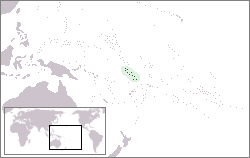
The islands which now form the Republic of Kiribati have been inhabited for at least seven hundred years,and possibly much longer. The initial Austronesian peoples’population,which remains the overwhelming majority today,was visited by Polynesian and Melanesian invaders before the first European sailors visited the islands in the 17th century. For much of the subsequent period,the main island chain,the Gilbert Islands,was ruled as part of the British Empire. The country gained its independence in 1979 and has since been known as Kiribati.

The first inhabitants of Tuvalu were Polynesians,so the origins of the people of Tuvalu can be traced to the spread of humans out of Southeast Asia,from Taiwan,via Melanesia and across the Pacific islands of Polynesia.

The current flag of Tuvalu was instated when the country became independent in 1978,after the separation from the Gilbert and Ellice Islands in 1976.

The Gilbert Islands are a chain of sixteen atolls and coral islands in the Pacific Ocean,about halfway between Papua New Guinea and Hawaii. They constitute the main part of the nation of Kiribati.

The Gilbert and Ellice Islands in the Pacific Ocean were part of the British Empire from 1892 to 1976. They were a protectorate from 1892 to 12 January 1916,and then a colony until 1 January 1976. The history of the colony was mainly characterized by phosphate mining on Ocean Island. In October 1975,these islands were divided by force of law into two separate colonies,and they became independent nations shortly thereafter:the Ellice Islands became Tuvalu in 1978,and the Gilbert Islands became part of Kiribati in 1979.
Sir Toaripi Lauti was a Tuvaluan politician who served as chief minister of the Colony of Tuvalu (1975–78),as the first prime minister following Tuvalu's independence (1978–1981) and governor-general of Tuvalu (1990–1993). He was married to Sualua Tui.

The British Western Pacific Territories (BWPT) was a colonial entity created in 1877 for the administration of a series of Pacific islands in Oceania under a single representative of the British Crown,styled the High Commissioner for the Western Pacific. Except for Fiji and the Solomon Islands,most of these colonial possessions were relatively minor.
The Tuvaluan dollar is one of the currencies of Tuvalu,whose unofficial international currency code is TVD. Tuvalu has never had banknotes of its own,and has been issuing coins since 1976. However,the Tuvaluan dollar is used as a unit of account,and is pegged to the Australian dollar at parity. From 1966 to 1976,Tuvalu officially used the Australian dollar. In 1976,Tuvalu began issuing its own coins,which continue to circulate alongside Australian coins. Tuvalu continues to use Australian banknotes. Tuvaluan coins are not legal tender in Australia. Similar to the Faroese króna's relationship to the Danish krone and the Panamanian balboa's relationship to the United States dollar,the Tuvaluan dollar is not an independent currency,but a variation of the Australian dollar.
Sir Tomu Malaefone Sione,,was a political figure from the Pacific nation of Tuvalu. He worked as a journalist from 1962 to 1968,and held the post of radio announcer in the Broadcasting and Information Department of the administration of the Gilbert and Ellice Islands Colony (GEIC). He was the head of the southern Niutao clan. He was married to Segali.

The Parliament of Tuvalu is the unicameral national legislature of Tuvalu. The place at which the parliament sits is called the Vaiaku maneapa. The maneapa on each island is an open meeting place where the chiefs and elders deliberate and make decisions.
The Congregational Christian Church of Tuvalu,commonly the Church of Tuvalu,is a Christian Church which is the state church of Tuvalu,although this status merely entitles it to "the privilege of performing special services on major national events";its adherents comprise about 86% of the 11,600 inhabitants of the archipelago.

The following outline is provided as an overview of and topical guide to Tuvalu:

The monarchy of Tuvalu is a system of government in which a hereditary monarch is the sovereign and head of state of Tuvalu. The current Tuvaluan monarch and head of state since 8 September 2022 is King Charles III. As sovereign,he is the personal embodiment of the Tuvaluan Crown. Although the person of the sovereign is equally shared with 14 other independent countries within the Commonwealth of Nations,each country's monarchy is separate and legally distinct. As a result,the current monarch is officially titled King of Tuvalu and,in this capacity,he and other members of the royal family undertake public and private functions domestically and abroad as representatives of the Tuvaluan state. However,the King is the only member of the Royal Family with any constitutional role.

United Nations Security Council resolution 1290 was adopted on 17 February 2000. Resolution 1290 examined Tuvalu's application to become the 189th member of the United Nations (UN). Tuvalu achieved independence in 1978 after over eighty years of British colonial rule. The country had struggled economically,and it took the 2000 sale of Tuvalu's Internet country code top-level domain .tv for the nation to be able to afford UN membership. Resolution 1290 was adopted unopposed,although China abstained due to concerns over Tuvalu's relationship with Taiwan.

This is a survey of the postage stamps and postal history of Tuvalu.
The Constitution of Tuvalu states that it is “the supreme law of Tuvalu”and that “all other laws shall be interpreted and applied subject to this Constitution”;it sets out the Principles of the Bill of Rights and the Protection of the Fundamental Rights and Freedoms.
Henry Faati Naisali,CMG,AO,OBE was a Tuvaluan politician who served as Deputy Prime Minister of Tuvalu (1985-1989),Secretary General of the Pacific Islands Forum (1988-1992) and Pro-Chancellor of The University of the South Pacific (1985-1990). He is notable for co-founding the Tuvalu Trust Fund which lead Tuvalu to achieve greater financial autonomy.
King George V School (KGV) was a government high school for boys in the Gilbert Islands,within the British colony Gilbert and Ellice Islands. Throughout its history it was in multiple locations in South Tarawa and Abemama. It served as a boarding school,and trained people to be government workers and teachers.

The Governor of the Gilbert and Ellice Islands was the colonial head of the Gilbert and Ellice Islands civil service from 1892 until 1979.

Tuvaluan nationality law is regulated by the 1986 Constitution of Tuvalu,as amended;the 1979 Citizenship Ordinance,and its revisions;and various British Nationality laws. These laws determine who is,or is eligible to be,a national of Tuvalu. Tuvaluan nationality is typically obtained either on the principle of jus soli,i.e. by birth in Tuvalu or under the rules of jus sanguinis,i.e. by birth abroad to parents with Tuvaluan nationality. It can be granted to persons with an affiliation to the country,or to a permanent resident who has lived in the country for a given period of time through naturalisation. Nationality establishes one's international identity as a member of a sovereign nation. Though it is not synonymous with citizenship,for rights granted under domestic law for domestic purposes,the United Kingdom,and thus the Commonwealth,have traditionally used the words interchangeably.










